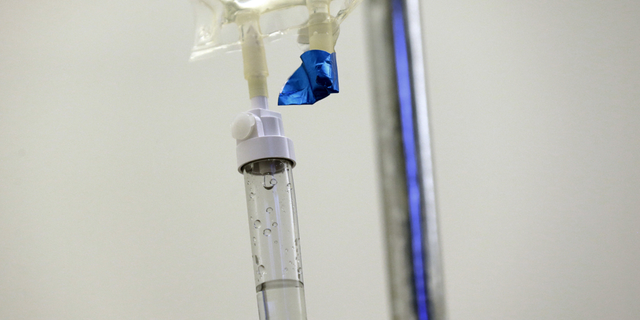An ongoing shortage of the cancer treatment drugs carboplatin and cisplatin is forcing American doctors to delay or modify treatment plans – or in some cases, try alternative medications altogether.
The head of the National Comprehensive Cancer Network (NCCN) is calling the matter an “unacceptable situation.”
“We are hearing from oncologists and pharmacists across the country who have to scramble to find appropriate alternatives for treating their patients with cancer right now,” NCCN CEO Robert Carlson said in a statement.
“We were relieved by survey results that show patients are still able to get life-saving care, but it comes at a burden to our overtaxed medical facilities,” he added. “We need to work together to improve the current situation and prevent it from happening again in the future.”
SUCRALOSE, A CHEMICAL IN SPLENDA, IS FOUND TO CAUSE ‘SIGNIFICANT HEALTH EFFECTS’ IN NEW STUDY
The NCCN said in a survey released Wednesday that 100% of the 27 affiliated centers it polled during a week at the end of May “are still able to treat patients who need cisplatin without any delays or claim denials.
“However, for carboplatin, that number drops to only 64% of centers that are able to keep all current carboplatin patients on the regimen. Another 20% report being able to continue this prescription for some but not all patients,” it added. “Overall, 16% report treatment delays as a result of needing to re-obtain prior-authorization for modified treatment plans, but none have met with outright denials.”
The organization described carboplatin and cisplatin as “platinum-based chemotherapies that are frequently used together for systemic treatment, often with the intent to cure.
“They have been proven to be highly effective across a variety of cancer types, including lung, breast, and prostate cancers, as well as many leukemias and lymphomas,” it also said. “They are estimated to be used in the treatment of as many as 500,000 new cancer patients per year.”
TWO NEW CANCER PILLS SHOW ‘UNPRECEDENTED RESULTS’ IN BOOSTING SURVIVAL RATES AND PREVENTING RECURRENCE

The shortage started developing earlier this year, Mike Ganio, who studies drug shortages at the American Society of Health-System Pharmacists, told The Associated Press.
“I think it went from being a shortage to being a really bad shortage really quickly,” he said. “There’s not a whole lot of room for it to get worse.”
Ganio’s society reported the cisplatin shortage in January, and then carboplatin in late March, months after a factory in India that makes both drugs paused production following an inspection that raised quality concerns.
Dr. Kari Wisinski, a breast cancer specialist with the UW Health Carbone Cancer Center in Madison, Wisconsin, which is part of the NCCN, told the AP that she has had to turn to other treatments for certain patients or switch the order in which people receive their drug combinations.
“It’s really difficult as a physician to have these conversations with a family or a patient about not having a medication you’d like to prescribe to them.”

The NCCN says of the cancer treatment centers surveyed, 93% are reporting a carboplatin shortage and 70% are reporting a cisplatin shortage.
In the meantime, the U.S. Food and Drug Administration is allowing temporary imports of foreign-approved versions of cisplatin from factories registered with the FDA, according to the Associated Press.
The Associated Press contributed to this report.
Read the full article here